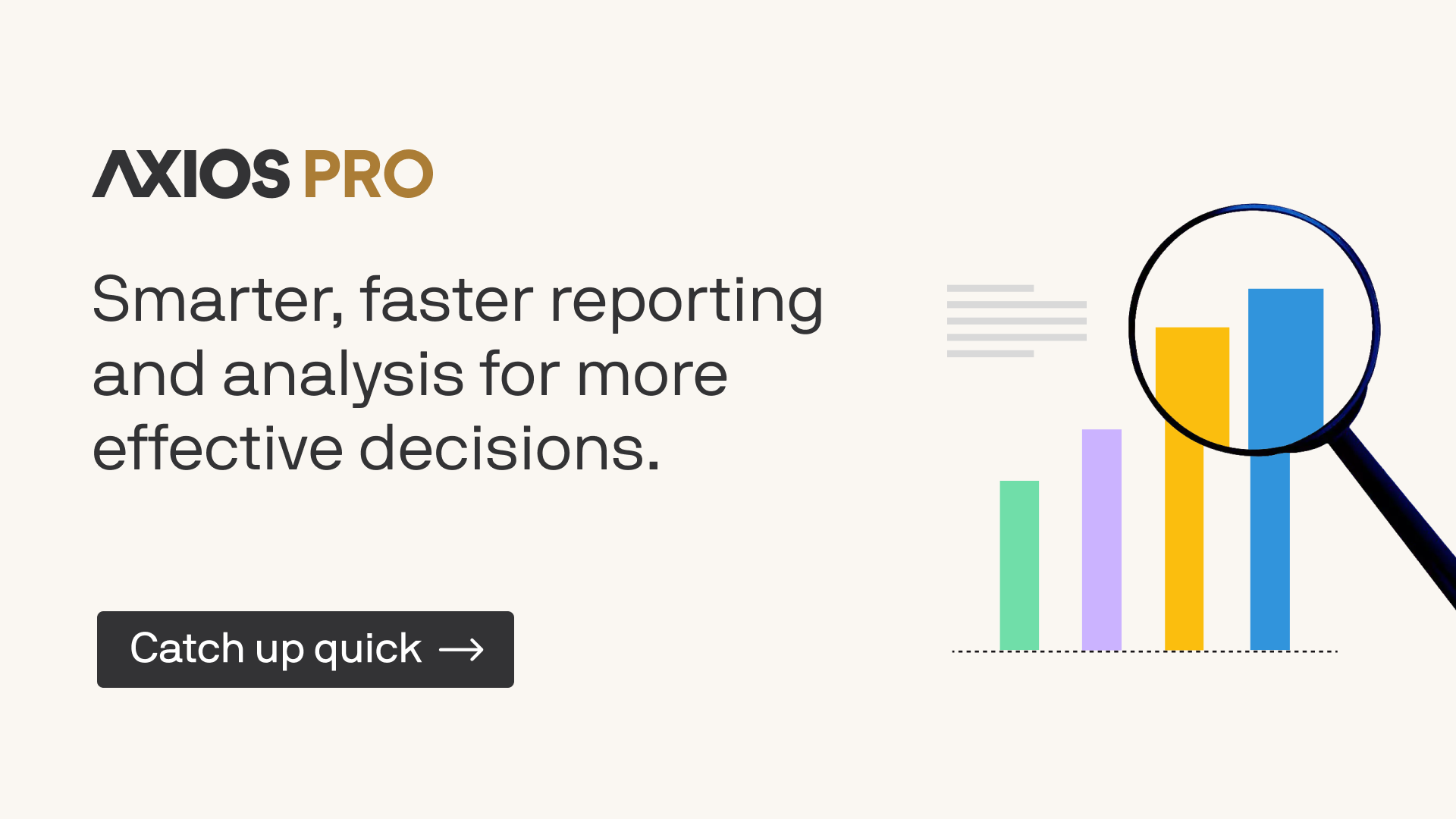Plus, FDA official resigns | Thursday, January 26, 2023
| | | | | | | | | | | Axios Vitals | | By Tina Reed · Jan 26, 2023 | | Good morning, Vitals readers. Today's newsletter is 953 words or a 3½-minute read. 👉 Situational awareness: A key FDA advisory committee meets today to weigh in on the future of COVID-19 vaccines. - And just in time, the CDC released data Wednesday showing the bivalent boosters' protection held up for at least three months against the XBB.1.5 subvariant of Omicron.
| | | | | | 1 big thing: New synthetic opioid complicates public health response to overdoses |  | | | Illustration: Aïda Amer/Axios | | | | A synthetic opioid up to 40 times more powerful than fentanyl is scrambling the public health response to the addiction crisis in a growing number of U.S. cities, Axios' Sabrina Moreno reports. The big picture: Nitazine comes in powder, pill and liquid form and is often laced into substances that users think are fentanyl or heroin. It's potentially lethal or can cause a more severe onset of withdrawal symptoms. State of play: Philadelphia health officials in December issued a public alert after detecting the opioid in four samples of street drugs. - The Drug Enforcement Administration flagged the emergence of the drug mixed into heroin or fentanyl in the Washington, D.C. area last June. In November, the agency said the continued evolution of synthetic opioids like nitazenes is "a public health concern."
- A warning from Ohio's attorney general in April 2022 called nitazenes "Frankenstein opioids" and reported a nearly seven-fold increase of nitazene cases — 27 to 143 — between the first quarter of 2021 and 2022.
The bottom line: New, more dangerous drugs could be entering the U.S. supply at a pace labs and clinicians aren't equipped to keep up with, said Steven Passik, Millennium Health's head of clinical data programs. - And due to their potency, "they'd kill a bunch of users before they are even trackable."
Share this story. |     | | | | | | 2. Abortion pill lawsuits challenge states |  | | | Illustration: Natalie Peeples/Axios | | | | A pair of lawsuits challenging abortion pill restrictions in North Carolina and West Virginia look to settle the question on whether states can regulate and restrict drugs that have been approved by the FDA, Axios' Oriana Gonzalez writes. The big picture: Shortly after the overturning of Roe v. Wade, the Justice Department released guidance saying that states cannot ban mifepristone, which is used in medication abortions. Details: The North Carolina lawsuit challenges the state's abortion pill restrictions, including those requiring that the drugs be dispensed in person by a physician in a certified surgical facility after a required counseling session and a 72-hour waiting period. - In West Virginia, GenBioPro — the maker of generic mifepristone — filed a lawsuit arguing that the state's abortion ban "constricted the market for mifepristone statewide," and negatively affected the company's "ability to conduct business" in the state.
What they're saying: "While it may not sit well with manufacturers of abortion drugs, the U.S. Supreme Court has made it clear that regulating abortion is a state issue," said West Virginia Attorney General Patrick Morrisey in a statement. What we're watching: These cases could potentially set a precedent that "FDA policy preempts state law," Greer Donley, an associate professor of law at the University of Pittsburgh School of Law, told Axios. Go deeper. |     | | | | | | 3. Top FDA food safety official resigns | | Frank Yiannas, a top FDA food safety official, resigned on Wednesday highlighting structural issues which "significantly impaired" the agency's ability to protect the public, multiple outlets report. Why it matters: In a letter to FDA commissioner Robert Califf, Yiannas — the deputy commissioner of the FDA's Office of Food Policy and Response — echoed concerns from an outside review last month from the non-profit Reagan-Udall Foundation, per Bloomberg News. - He said he'd planned to resign last year, but stayed on to help address the formula crisis, in which production problems created safety concerns and severe shortages in critical baby formula supplies.
- His last day is Feb. 24.
What he's saying: "My fervent hope is that American consumers, especially mothers and fathers of infants, never again have to face this type of preventable situation," Yiannas said in his letter Califf, per a copy of the letter posted by Food Safety News. What to watch: The FDA is expected to release a public update on its "new vision" by the end of January, including planned changes to its leadership structure and internal processes, Califf said last month. |     | | | | | | A message from Axios | | Start 2023 ahead of the competition | | |  | | | | Get ahead of the competition in 2023 with exclusive health tech scoops and trends from Axios Pro: Deals. Get access now. | | | | | | 4. Data du jour: Baby boom |  Data: PitchBook; Chart: Axios Visuals Fertility technology startups are in the midst of a funding frenzy, reaching more than $800 million in 2022 as demand for fertility services continues to climb, Axios' Erin Brodwin writes. By the numbers: Venture funding of fertility-focused technology has risen steadily over the last decade, with $854.5 million invested in 2022, per PitchBook. - That compares with $305.7 million in 2017 and $134 million in 2012.
Between the lines: It comes after the economic and social realities of family planning have drawn a harsh spotlight in recent years. - The economics of infertility treatments remain heavily opaque, and insurance coverage varies dramatically by state and provider.
- The industry's inequities disproportionately impact LGBTQ people, low-income people and people of color.
- The end of Roe v. Wade has enabled states to pursue reproductive health legislation that can create new challenges for patients and providers.
What they're saying: "We believe the ability to build a family is a basic human right," says Sunfish CEO Angela Rastegar. |     | | | | | | 5. Catch up quick | | 📈 A record of people — more than 16 million — signed up for insurance through Obamacare. (The Hill) 👀 Ketamine is being sold as a depression wonder drug. For some, it's making everything worse. (Insider) 🏛 A coalition of groups are suing the FDA over antibiotic misuse in livestock. (CIDRAP) 👉 Rep. Marjorie Taylor Greene, who's espoused COVID conspiracy theories, was tapped to investigate the government's COVID response. (Rolling Stone) |     | | | | | | A message from Axios | | Start 2023 ahead of the competition | | |  | | | | Get ahead of the competition in 2023 with exclusive health tech scoops and trends from Axios Pro: Deals. Get access now. | | | | Thanks for reading, and thanks to senior editor Adriel Bettelheim and senior copy editor Bryan McBournie for the edits. |  | | Your personal policy analyst is here. | | | | | | Axios thanks our partners for supporting our newsletters.
Sponsorship has no influence on editorial content. Axios, 3100 Clarendon Blvd, Arlington VA 22201 | | | You received this email because you signed up for newsletters from Axios.
To stop receiving this newsletter, unsubscribe or manage your email preferences. | | | Was this email forwarded to you?
Sign up now to get Axios in your inbox. | | | | Follow Axios on social media:    | | | | | |








No comments:
Post a Comment